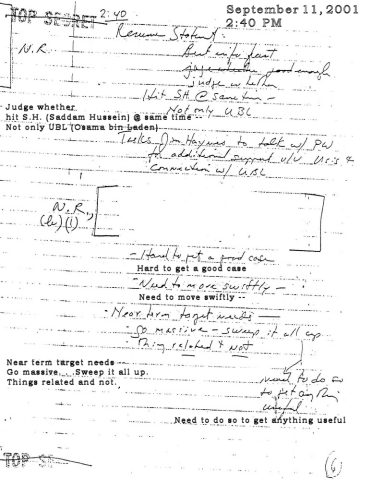I suppose my last post was about bias, and how it influences decisions. So speaking of bias, Steve Clemmons of The Washington Note posts about outragedmoderates.org obtaining the notes from a staffer’s meeting with Donald Rumsfield on September 11, 2001 in the mid afternoon [the typed in translations are mine]:

We were all crazy that day. But the notes make clear two things:
-
Donald Rumsfield immediately knew who had hit the Twin Towers – Osama Bin Laden.
-
They were looking for a reason to depose Saddam Hussein and he was thinking of how to include him in any response before the dust in the streets of Manhatten had even settled. I presume "hard to get a good case" refers to Iraq, but it’s clear that it wasn’t going to stop them.
 They had their sights set on Hussein from the getgo. The 911 attack was a fine excuse to move forward rapidly, not the reason. This was the climate before Bush’s West Point speech, before the Niger Hoax was engaged, before the Aluminum Tubes excuse. The plan literally came before the reasons for the plan. He even says it outright, "Things related and not." But in order to do what they wanted to do, they worked at making it appear that unrelated things were related – by lying.
They had their sights set on Hussein from the getgo. The 911 attack was a fine excuse to move forward rapidly, not the reason. This was the climate before Bush’s West Point speech, before the Niger Hoax was engaged, before the Aluminum Tubes excuse. The plan literally came before the reasons for the plan. He even says it outright, "Things related and not." But in order to do what they wanted to do, they worked at making it appear that unrelated things were related – by lying.
That’s the legacy of A.E.I., P.N.A.C., Ledeen, Mylroie, Wolfowitz, Feith, Bolton, Cheney, Rumsfield, etc. That’s what bias is – a conclusion in search of a reason to reach it.
I strongly suspect that the ‘wartime’ powers that Bush tells us are because we are at war have a similar history. They wanted those powers before there was a war to rationalize seizing them.
Function: noun
: a personal and often unreasoned judgment for or against one side in a dispute : PREJUDICE
Source: Merriam-Webster’s Dictionary of Law, © 1996 Merriam-Webster, Inc.
Sorry, the comment form is closed at this time.